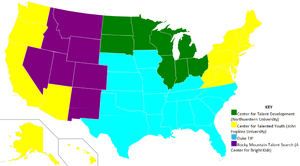Talent Identification Program

The Duke University Talent Identification Program (Duke TIP) is a gifted education program based at Duke University. Its stated purpose is to identify gifted children and provide them and their parents the resources for them to reach their full educational potential. The first talent search took place in 1980.[1]
Duke TIP operates in sixteen states throughout the Southeast and Midwest, specifically the states of Alabama, Arkansas, Florida, Georgia, Iowa, Kansas, Kentucky, Louisiana, Mississippi, Missouri, Nebraska, North Carolina, Oklahoma, South Carolina, Tennessee, Texas, and in Indiana.[2] Duke TIP also allows students who used to live in the Southeast and Midwest at the time of their qualification for the program but then moved out of state.
The flagship sites for the TIP Center for Summer Studies, which has the most stringent qualification requirements, run at both Duke East Campus (with classes focused broadly in the humanities) and West campus (with classes primarily focused in the sciences).[3] Other sites include the Duke Marine Laboratory and Georgia Tech. Sites for the Academy for Summer Studies, which has slightly lower admissions requirements, include Rice University and the University of Georgia.[4]
Campuses include: Rice University, University of Kansas, University of Georgia, Duke University East Campus, Duke University West Campus, Davidson College, New College of Florida, the Duke University Marine Lab, Trinity University, Appalachian State University, Wake Forest University, Georgia Tech, and Austin College. Texas A&M University was used as a campus as well until its discontinuation in 2013.
Children are identified as part of the 4th–6th Grade Talent Search and/or as part of the 7th Grade Talent Search. In the 7th Grade Talent Search, students take the SAT or ACT. If a student does exceptionally well on these exams, he or she can receive state and even grand (national) recognition for his or her efforts. This usually entails a congratulatory letter, medals, and an invitation to attend an awards ceremony. In 2013, 64,000 students in the 7th grade took the SAT or the ACT.
TIP also runs several summer and weekend residential programs for academically gifted students, including Summer Studies (grades 7–10), Field Studies and Institutes (grades 9–12), eStudies and eSeminars (grades 8–12), Academic Adventures (grades 5–6), Scholar Weekends (grades 8–11), and CRISIS! (grades 5–6). [5]Independent learning opportunities are also available.
See also
- Center for Talent Development, Northwestern University
- Center for Talented Youth, Johns Hopkins University
- Rocky Mountain Talent Search, University of Denver
Notes
- ↑ Putallaz, Martha; Baldwin, Joy; Selph, Hollace (June 2005). "The Duke University Talent Identification Program". High Ability Studies 16 (1): 41–54. doi:10.1080/13598130500115221.
- ↑
- ↑ http://tip.duke.edu/node/376
- ↑ http://tip.duke.edu/node/372
- ↑ "Duke TIP Overview" (PDF). Duke Talent Identification Program. Retrieved September 15, 2014.
External links
- Duke TIP website
- TIPwiki - a website created and run by attendants and alumni of TIP's various programs
- TiP Forums - forums created and run by attendants and alumni of TIP's summer programs
